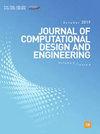Utilizing Bee Foraging Behavior in Mutational Salp Swarm for Feature Selection: A Study on Return Intentions of Overseas Chinese after COVID-19
IF 6.1
2区 工程技术
Q1 COMPUTER SCIENCE, INTERDISCIPLINARY APPLICATIONS
引用次数: 0
Abstract
Abstract We present a Bee Foraging Behavior Driven Mutational Salp Swarm Algorithm (BMSSA) based on an improved bee foraging strategy and an unscented mutation strategy. The improved bee foraging strategy is leveraged in the follower location update phase to break the fixed range search of SSA, while the unscented mutation strategy on the optimal solution is employed to enhance the quality of the optimal solution. Extensive experimental results on public CEC 2014 benchmark functions validate that the proposed BMSSA performs better than nine well-known metaheuristic methods and seven state-of-the-art algorithms. The Binary BMSSA algorithm is further proposed for feature selection by using BMSSA as the selection strategy and support vector machine as the classifier. Experimental comparisons on twelve UCI datasets demonstrate the superiority of binary BMSSA. Finally, we collected a dataset on the return-intentions of overseas Chinese after COVID-19 through an anonymous online questionnaire and performed a case study by setting up a binary BMSSA-based feature selection optimization model. . The case study shows that the development prospects, the family and job in the place of residence, seeking opportunities in China, and the possible time to return to China are critical factors influencing the willingness to return to China after COVID-19.利用突变Salp群体的蜜蜂觅食行为进行特征选择——COVID-19后海外华人回归意愿研究
摘要提出了一种基于改进蜜蜂觅食策略和无气味突变策略的蜜蜂觅食行为驱动突变Salp群算法(BMSSA)。在跟踪者位置更新阶段利用改进的蜜蜂觅食策略打破了SSA的固定范围搜索,而在最优解上采用无气味突变策略提高了最优解的质量。在公共CEC 2014基准函数上的大量实验结果验证了所提出的BMSSA优于9种知名的元启发式方法和7种最先进的算法。采用BMSSA作为特征选择策略,支持向量机作为分类器,进一步提出了二元BMSSA算法进行特征选择。在12个UCI数据集上的实验比较表明了二元BMSSA的优越性。最后,我们通过匿名在线问卷收集了海外华人在新冠肺炎疫情后的回归意愿数据集,并通过建立基于二元bmssa的特征选择优化模型进行了案例研究。案例研究表明,发展前景、居住地的家庭和工作、在中国寻找机会以及可能回国的时间是影响新冠肺炎后回国意愿的关键因素。
本文章由计算机程序翻译,如有差异,请以英文原文为准。
求助全文
约1分钟内获得全文
求助全文
来源期刊

Journal of Computational Design and Engineering
Computer Science-Human-Computer Interaction
CiteScore
7.70
自引率
20.40%
发文量
125
期刊介绍:
Journal of Computational Design and Engineering is an international journal that aims to provide academia and industry with a venue for rapid publication of research papers reporting innovative computational methods and applications to achieve a major breakthrough, practical improvements, and bold new research directions within a wide range of design and engineering:
• Theory and its progress in computational advancement for design and engineering
• Development of computational framework to support large scale design and engineering
• Interaction issues among human, designed artifacts, and systems
• Knowledge-intensive technologies for intelligent and sustainable systems
• Emerging technology and convergence of technology fields presented with convincing design examples
• Educational issues for academia, practitioners, and future generation
• Proposal on new research directions as well as survey and retrospectives on mature field.
 求助内容:
求助内容: 应助结果提醒方式:
应助结果提醒方式:


